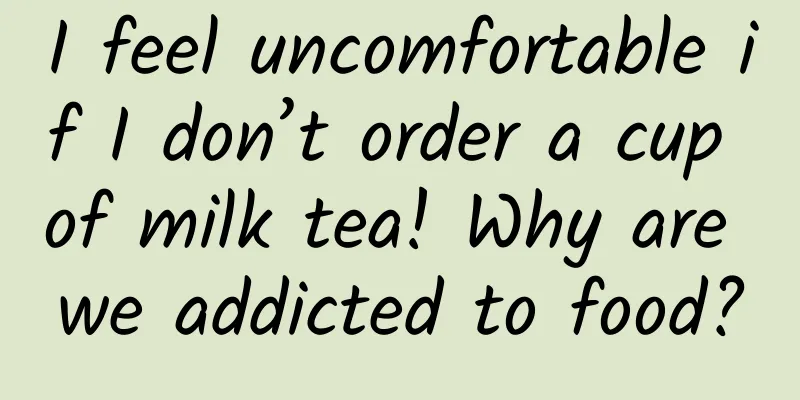I feel uncomfortable if I don’t order a cup of milk tea! Why are we addicted to food?

|
During the day at work, I always feel uncomfortable if I don’t order a cup of milk tea; Lying in bed in the middle of the night, I wanted to eat beer and fried chicken, and I wanted to eat so much that I couldn't sleep... Even though I was already very full, I couldn't help but want to eat a little more of a certain food. Have you ever experienced any of the above situations? If the above situation occurs, does it mean that we are "addicted" to food? "Addiction" sounds a bit scary, because "food addiction will lead to obesity" can be said to be a causal relationship that is generally accepted by everyone. We are unconsciously attracted to delicious food, and we will naturally eat more of the things we like. So how do we define whether we are gluttonous or truly addicted? Addictive eating behaviors In life, our general understanding of "food addiction" may be that we cannot stop eating certain foods, or that we continue to eat excessive amounts of food due to excessive stress, bad mood, etc. But the real "addiction" is more than that. About ten years ago, the Connecticut College in the United States put forward an argument that "the Oreo cookies we usually eat are as addictive as the notorious drug cocaine." After hearing this, do you suddenly feel that the Oreo in your hand doesn’t taste as good anymore? therecoveryvillage In 2015, the Diagnostic and Statistical Manual of Mental Disorders, a guidebook most commonly used in the United States and other countries to diagnose mental illness, proposed that the criteria for diagnosing whether a substance has an "addiction disorder" should include three points: tolerance, withdrawal symptoms, and dependence. And in the most recently updated version, one more item was added: "craving, or having a strong desire, or an urgent need to ingest a substance." Schematic diagram of the food addiction cycle (Zheng Mingjing et al., Food Science, 2014) In other words, food "addiction" is not only about wanting to eat, loving to eat, and eating frequently, but it is also manifested in the inability to rationally control the amount and time of consumption of a certain food. At the same time, due to excessive and irregular consumption, one's tolerance to food increases. Once withdrawal occurs, negative emotions such as anxiety, depression and anger will occur, which will increase the craving for food, and the binge eating behavior will be repeated or even aggravated. This type of symptom is similar to the behavioral characteristics of drug addiction and alcohol addiction, and cross-sensitization will also occur. How to determine whether you have addictive eating behavior? In addition to the written definition, if we want to determine whether we have developed food addiction behavior, we can use a research questionnaire developed by Yale University called the Yale Food Addiction Scale (YFAS) to evaluate whether the subject is food addicted (FA), which can help people describe their symptoms in scientific language. The questions in the scale are mainly about the subjects' eating habits in the past year. The behavioral indicators mainly include: control over eating certain foods, control after recognizing the adverse consequences, and whether they have tried and successfully quit eating the food. Part of the Yale Food Addiction Scale (YFAS) research questionnaire The questionnaire contains 11 symptoms in total. No single symptom can be defined as addiction, but rather it is judged by multiple symptoms together. If there are 2-3 symptoms, it means mild addiction, 4-5 symptoms means moderate addiction, and 6 or more symptoms means severe addiction. (Friends who are worried about their food addiction can directly search online to take the test. Of course, your own test can only be used as a reference, and the actual diagnosis still needs to be sought from professionals) How does food become addictive? But how can a small Oreo be as addictive as cocaine? Why don't we become addicted to boiled vegetables in diet meals, so that losing 15 pounds a month is no longer a dream? This requires understanding the mechanisms behind food addiction in order to help manage our eating behavior. Some studies have shown that human eating is regulated by the "dopamine system", a reward system in the human brain. I believe many people have heard of dopamine, a substance that is associated with "happiness" and "excitement". Simply put, eating makes us feel happy and satisfied. In fact, it is not just dopamine, but the brain's reward system also involves a variety of neurotransmitters such as acetylcholine and opioids. The impact of dopamine on human emotions, pic2.zhimg The specific feedback mechanism in the human body is that as the amount of food eaten increases, the secretion of dopamine increases. Acetylcholine is usually considered to be related to satiety, and the more you eat, the more it is secreted. Opioids interact with central specific receptors, which can relieve pain and produce a sense of happiness. Ultimately, people are in a state of excitement about eating, unable to control their appetite and eat too much. Addictive behaviors that are more similar to alcohol and drugs are also reflected in the fact that when we first taste a new food, a large amount of dopamine is secreted in the body. After eating the same food repeatedly, the dopamine secretion will weaken until it no longer increases the secretion of this food. This prompts us to eat more if we want to get the same happiness as before! Over time, the memory of a previous reward can cause a biological response like craving. Fight food addiction, fmidr.com Addictive ingredients in food are key factors affecting food addiction, and common addictive ingredients include salt, sugar, fat, caffeine, etc. This is because these ingredients will give food a better taste and flavor, fully stimulate people's appetite, and please people's sensory nerves. Therefore, it is not difficult to understand why candied fruits, cola, potato chips, chocolate, bacon, cakes, etc. always make us love and hate them and cannot give them up. After reading this, did you silently hold down your hand that was about to order takeout? In fact, in our country, the problem of food addiction is not prominent. This may be due to the physique of Chinese people. After consuming too much high-sugar or fried food, in addition to long-term weight gain, acne breakouts are also common in the short term. This will remind us and indirectly develop a disgust for such food and consciously resist it. In general, there is nothing wrong with thinking “the world is so big and I want to try some”. Just stay alert to the risk of food addiction and eat at the right time and in the right amount. What food are you kind of addicted to? References: [1] Zheng Mingjing, Guo Zebin, Zheng Baodong, et al. Research progress and implications of food addiction[J]. Food Science, 2015(9):8. [2] Lan Yan, Li Zhiming, Yan Wansen. Research status of food addiction and its mechanism[J]. Chinese Journal of Drug Dependence, 2017, 26(5):4. [3] Chen Mengqian, Xia Hongyun, Lin Bin, et al. Research on food addiction and its regulatory mechanism[J]. China Science and Technology Expo, 2014(32):1. END Review expert: Li Xianhong, Psychological Counseling Center, 371 Central Hospital of PLA Tadpole Musical Notation original article, please indicate the source when reprinting Editor/Heart and Paper |
<<: Going to the heavens for the country! Happy 24th birthday to the Astronaut Corps!
Recommend
Analysis of practical cases of advertising in the education and training industry
What should I do if I want to increase the number...
Shocked! The brown color in this painting is actually made by a mummy?
The painting below is by the artist Martin Drolli...
How to take advantage of the popularity? I have summarized 19 techniques!
Hot spots are the fulcrum for operators to pry th...
Why are some people still teenagers at the age of 70, while others suffer from cervical spondylitis at the age of 17?
In the traditional concept, cervical spondylosis ...
From 4P to 5A, how to promote automobile marketing?
Nowadays, no matter what industry you are in, you...
Relay "Chasing the Sun" Bravely Climbing - Get to Know the Chinese "Artificial Sun" Research Team
General Secretary Xi Jinping emphasized that stre...
Microsoft has earned more than $6 billion in patent fees through the Android platform
[[154452]] According to foreign media reports, Mi...
The dispute between Cainiao and SF Express has come to an end: both parties still need to cooperate, who can resist money?
Just as the public was still speculating which co...
Traffic diversion and retention of Douyin private domain traffic pool
I have personally been focusing on the operation ...
With these new ways to play H5, are you still worried about running out of inspiration?
Understand the new capabilities and gameplay brou...
Essential for developers: 2018 Android SDK tool recommendations
Pimple Popper is an app that pops virtual pimples...
A method that makes fruit taste 10,000 times better! It will be too late if you don’t try it now!
As summer is about to begin, many summer fruits a...
How do frogs swallow food? They push with their eyeballs!
Editor’s Note: After the comprehensive science ex...
4-step method to increase user growth
There is a group of users staying in their own pr...
What are the important functions of art app development?
The development of the art mini program combines ...









